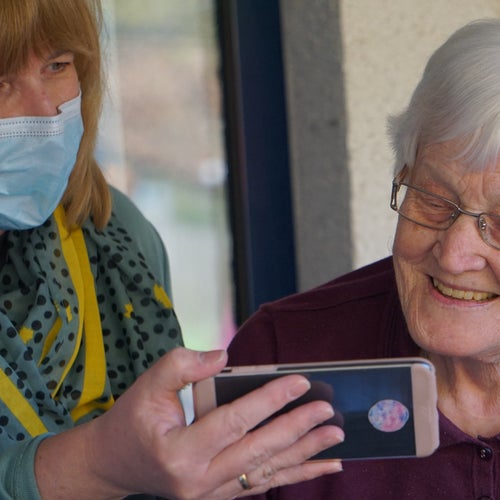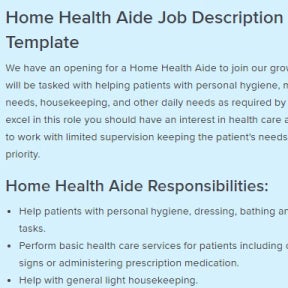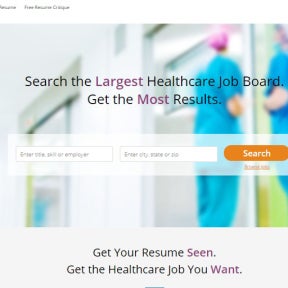How to Hire a Home Health Aide (HHA):

A step-by-step guide to finding top-quality home health aides (HHA) for your elderly relative, day care facility, group home, or hospice. Includes a full hiring process that will help you find and hire the best home health aides fast.
Attract the best home health aides.
Sell the opportunity to them.

HHAs can work in a large variety of settings — from group homes and hospices to private residences and day care facilities — depending on their qualifications, career objectives, and individual preferences. To attract the candidate that will be the best fit for the position, consider the type of home health aide you require and the benefits that may interest them.
Some things that HHAs value include:
- Jobs that are close to home.
- Fair compensation and bonuses.
- Respect and a well-supported environment.
- Decent working hours.
- Flexibility.
- Meaningful work and job satisfaction.
- Reasonable shifts.
- Training and growth opportunities.
- Paid vacations.
- Comprehensive medical insurance.
If you're a facility, find out what aspects of the job and/or environment employees value most. Similarly, if you're hiring an HHA for a loved one, you should have an idea of what previous HHAs enjoyed most about the job. These insights will help you make a comprehensive list of all the benefits on offer.
Construct a profile of the ideal candidate and make a list of all the benefits that would be important to them. If you're looking to attract a retired nurse, a new graduate, or a home health aide who is able to sleep at the facility, construct a job post that's aimed at them.
Craft a compelling home health aide job post.

The demand for HHAs is great, but a lack of qualified candidates can make the hiring process challenging. Whether you're hiring an HHA to look after your elderly mother or hoping to attract suitable candidates to your home healthcare agency, writing a precise description that outlines the key aspects of the job, as well as the required experience and qualifications, will help weed out unsuitable candidates.
Clearly outline the requirements, duties, and limitations of the position you're offering.
Be sure to mention the nature of the job in the description. Be as specific as possible, including details about the patient, such as long-term and short-term care, etc.
Include your location so interested candidates can map out routes, calculate travel time, or consider relocating if offered the job.
Be transparent about the number of shifts they'll be required to work, and if they'll have to respond to emergencies.
Flexibility, career growth, and meaningful work are important to many HHAs, so focus on these aspects to create a powerful job posting.
Use an HHA job description template to make it easier.

An HHA job description template will provide much of the boilerplate information you'll need, such as responsibilities and qualifications, making your task a bit easier.
Advertise the position.
Post your job to general sites.

Start by posting to general job posting sites such as Indeed. These are great places to start because they get plenty of traffic and they're free.
Make sure your job is picked up by Google.

Google for Jobs allows your posting to be seen in search results. This can greatly increase your job visibility. You can get it picked up by Google by having someone properly format it on your website, or by using a service (such as Betterteam) that creates a properly formatted jobs page for you automatically.
Target dedicated job boards for healthcare professionals.

This will narrow your search to HHAs who might be a more suitable fit. Use a job posting site for healthcare professionals to advertise vacancies.
When you advertise positions for HHAs on job boards focused on healthcare jobs, you may attract candidates who are interested in advancing their careers, so be sure to mention growth opportunities in your posting.
Recruit candidates directly from vocational schools.

When you create pipelines from vocational schools, you increase your chances of attracting top candidates who are up to date with the latest practices in-home healthcare. You are also assured that anyone you hire from a trusted college will have the correct certifications and licenses and will also have passed the required background checks.
Ask employees for referrals.

If you're hiring an HHA for a facility, asking current employees for referrals is a great way to find top talent. Create an employee referral program to motivate employees to participate in the recruiting process. Essentially, the program offers rewards for any referrals leading to hires. Make sure it is clear to your employees that the HHA they refer should have the necessary skills, qualifications, experience, work ethic, and attitude.
If you're hiring a private HHA to care for an elderly person, child, individual with a disability, or a recovering adult, you can hire a home health aide through an agency, or call a local nursing home or similar facility to ask if they can recommend anyone.
Vet your candidates.
Screen your applicants.

A quick and easy way to screen potential candidates is to send an email with a few basic questions, such as:
- How long have you worked as a home health aide?
- What kind of training have you completed in the home health aide field?
- What certifications and licensing do you have?
If you're concerned some candidates may ignore the email, you can arrange for someone to make a quick call and ask these questions directly.
Conduct background checks.

Because HHAs may be working closely with senior citizens, recovering patients, persons with disabilities, or children, it is important to run a thorough background check to make sure they have a clean criminal record and that the skills, experience, and qualifications on their resumes are accurate.
You can run a background check by using background check services.
Conduct a phone interview.

Telephone interviews are faster, less stressful, and more cost-effective than in-person interviews. One of the most important qualities in an HHA is personability, and a telephone interview will give you a better sense of a candidate's personality than an emailed response would. Phone interviews are especially useful when potential candidates reside in other states.
Be sure to review the screening questions and check if their responses are consistent during the telephone interview. Also, enquire about their expectations regarding salary and benefits, and find out why they left their previous job.
Possible questions to ask home health aides:
- Why did you leave your last home health aide job?
- What do you expect for salary and benefits?
- What days and/or times are you available to work?
- Are you able to work evenings?
- Are you able to respond to emergencies?
- When will you be able to start?
- Can you pass a drug test?
- Being a home health aide isn't an easy job. What are some of your coping strategies?
- What made you interested in this home health aide position?
Identify any red flags during the interview. If they left their previous job because of issues that will be present in this one, for example, having to respond to emergencies at all hours of the night, this candidate won't be a good fit. If their salary or benefits expectations don't align with yours, it's probably time to cross them off the shortlist.
Take note of why they're interested in the job, and reiterate the particulars they find most enticing.
Conduct an in-person interview.

Now that you've screened your candidates and narrowed down the applicant pool even further, it's time to meet your candidates. Make sure they're on time and that they present themselves well. If possible, have the person they'll be caring for sit in on the interview and ask questions of their own. Initial meetings can be a bit formal and tense, but it's usually a good sign if they like each other.
The in-person interview is your chance to really sell the job to them, so be sure to remind them of the benefits you offer. Have a look at our HHA interview questions for some inspiration.
Take the candidate on a tour of the house or care facility and walk them through what a typical day might entail.
If the job includes physical tasks like lifting clients, being on their feet all day, moving heavy items, etc., make sure the candidate can perform these tasks.
Encourage them to ask questions and pay attention to the type of concerns they have.
Also take note of their reactions to the environment, including their initial response to the person or persons they will be caring for.
Hire your new home health aide.
Make an offer.

Once you've found the ideal HHA, you'll want to make them an offer fairly quickly, as they may have other prospects to consider. This is often best done in an informal call first, followed by a letter or email that provides the job description, salary, and benefits information.
Use our job offer letter template to craft a compelling and professional letter.
Onboard your new home health aide.

Onboarding is a key final step in the hiring process that is not to be overlooked. Make a good first impression and get the new hire up and running fast by having a detailed and organized onboarding process.
The onboarding process can vary greatly with HHAs as it depends on the type of environment they find themselves in. At bigger institutions, they may report to a senior nurse or another mentor, while they may rely upon a family caregiver for advice and support in a home setting. Regardless of the work environment, make sure there is always someone the HHA can contact if they have questions or concerns.
How to Find Certified Nursing Assistants (CNAs)


